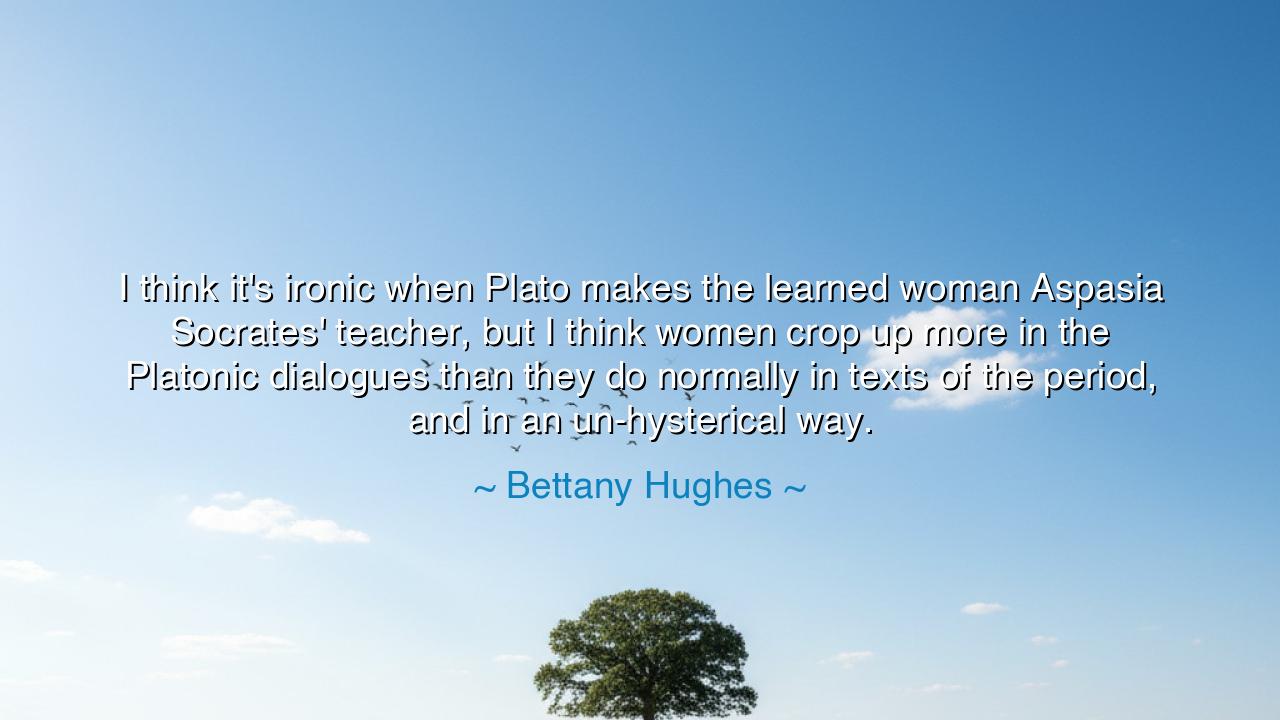
I think it's ironic when Plato makes the learned woman Aspasia
I think it's ironic when Plato makes the learned woman Aspasia Socrates' teacher, but I think women crop up more in the Platonic dialogues than they do normally in texts of the period, and in an un-hysterical way.






Hear the words of Bettany Hughes, historian and keeper of memory: “I think it's ironic when Plato makes the learned woman Aspasia Socrates' teacher, but I think women crop up more in the Platonic dialogues than they do normally in texts of the period, and in an un-hysterical way.” In this reflection, she uncovers both irony and triumph. For in an age when women were often silenced, Plato dared to give them voices within his dialogues, and to allow them to speak not with frenzy or folly, but with clarity, reason, and dignity.
To call it ironic that Plato makes Aspasia, a woman of intellect and influence, the teacher of Socrates, is to highlight the paradox of Greek society. In Athens, women were largely confined to the household, denied public roles in philosophy or politics. Yet Aspasia of Miletus, the companion of Pericles, was famed for her wit, her rhetoric, and her ability to move minds. Plato, by placing her as Socrates’ teacher, inverted the expectations of his time: the supposed master of wisdom receiving instruction from a woman. The irony is sharp, but it also reveals Plato’s subtle acknowledgment that truth can be borne by any voice, regardless of gender.
This act gains even greater weight when we remember the broader context. In most texts of the ancient world, women appeared only as background figures, or as symbols of passion, danger, or disorder. But in Plato’s writings, as Hughes notes, women crop up more often, and when they do, they are not reduced to caricatures. Diotima, in the Symposium, is the wise priestess who teaches Socrates about love itself. She is not hysterical, nor diminished, but profound, revealing truths that echo through centuries. Here we see the power of Plato’s imagination: that philosophy, if it is to be true, must listen to voices often ignored.
History provides further testimony. Consider the Stoic philosopher Hipparchia, who lived in the generation after Plato. She defied conventions by joining the Cynic school, walking alongside her husband Crates in public, debating men, and composing works of philosophy. The world may have called her eccentric, but in truth she was continuing the path opened by women like Aspasia and Diotima—women whose presence proved that wisdom is not confined to men. Plato, by recording such figures, gave future ages a glimpse of what might be possible.
The meaning of Hughes’ words, then, is that even in times of constraint, truth has a way of breaking through. Plato may not have been a revolutionary in matters of gender, but he was honest enough to recognize that wisdom is not chained by custom. In presenting women as teachers and thinkers, he planted seeds of respect that would grow slowly across the centuries. To record a woman’s wisdom in a serious and “un-hysterical” manner was itself a radical act in his time, one that whispers even now: truth has no gender.
The lesson for us is both urgent and eternal. We must listen for wisdom wherever it appears, whether in the voices of men or women, young or old, powerful or humble. To deny a voice because of custom is to deny ourselves a part of truth. Plato, in his way, reminds us through Aspasia and Diotima that the teacher may come in unexpected form, and that the seeker of wisdom must be ready to receive instruction even from those society dismisses.
So I say to you, seekers of truth: remember Hughes’ insight. Honor the voices of women in history and in your own day, not as tokens, nor as anomalies, but as bearers of wisdom equal to any. If Plato could imagine Socrates being taught by Aspasia, then we too must imagine, and live, a world where no voice is excluded from the temple of truth. For wisdom, like light, shines on all who are willing to see—and its brilliance is diminished when any part of it is ignored.






AAdministratorAdministrator
Welcome, honored guests. Please leave a comment, we will respond soon